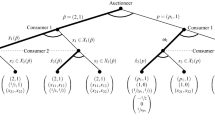Summary.
We study the process of learning in a differential information economy, with a continuum of states of nature that follow a Markov process. The economy extends over an infinite number of periods and we assume that the agents behave non-myopically, i.e., they discount the future. We adopt a new equilibrium concept, the non-myopic core. A realized agreement in each period generates information that changes the underlying structure in the economy. The results we obtain serve as an extension to the results in Koutsougeras and Yannelis (1999) in a setting where agents behave non-myopically. In particular, we examine the following two questions: 1) If we have a sequence of allocations that are in an approximate non-myopic core (we allow for bounded rationality), is it possible to find a subsequence that converges to a non-myopic core allocation in a limit full information economy? 2) Given a non-myopic core allocation in a limit full information economy can we find a sequence of approximate non-myopic core allocations that converges to that allocation?
Similar content being viewed by others
Author information
Authors and Affiliations
Additional information
Received: May 25, 1999; revised version: August 9, 1999
Rights and permissions
About this article
Cite this article
Serfes, K. Non-myopic learning in differential information economies: the core. Econ Theory 18, 333–348 (2001). https://doi.org/10.1007/PL00004187
Issue Date:
DOI: https://doi.org/10.1007/PL00004187



